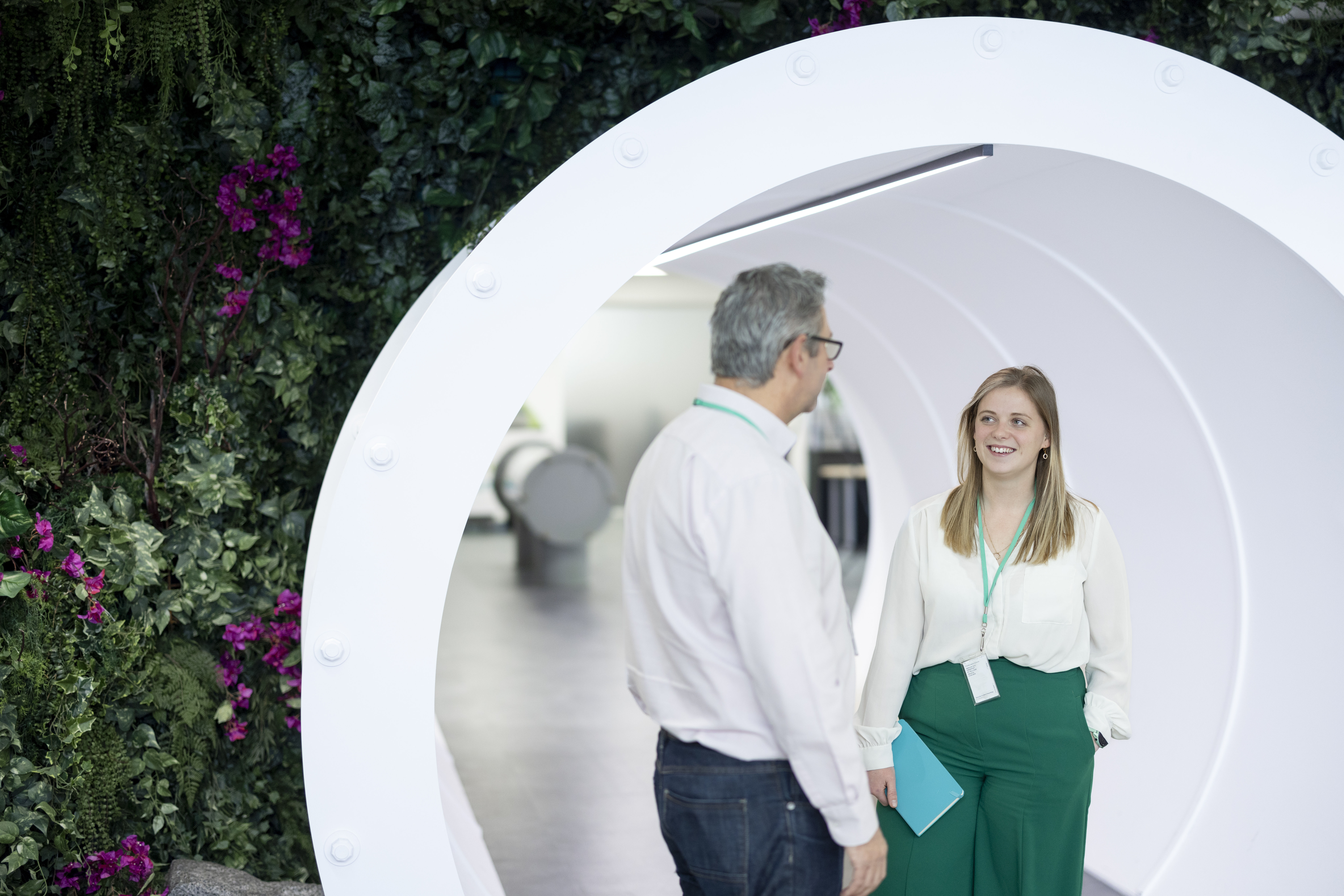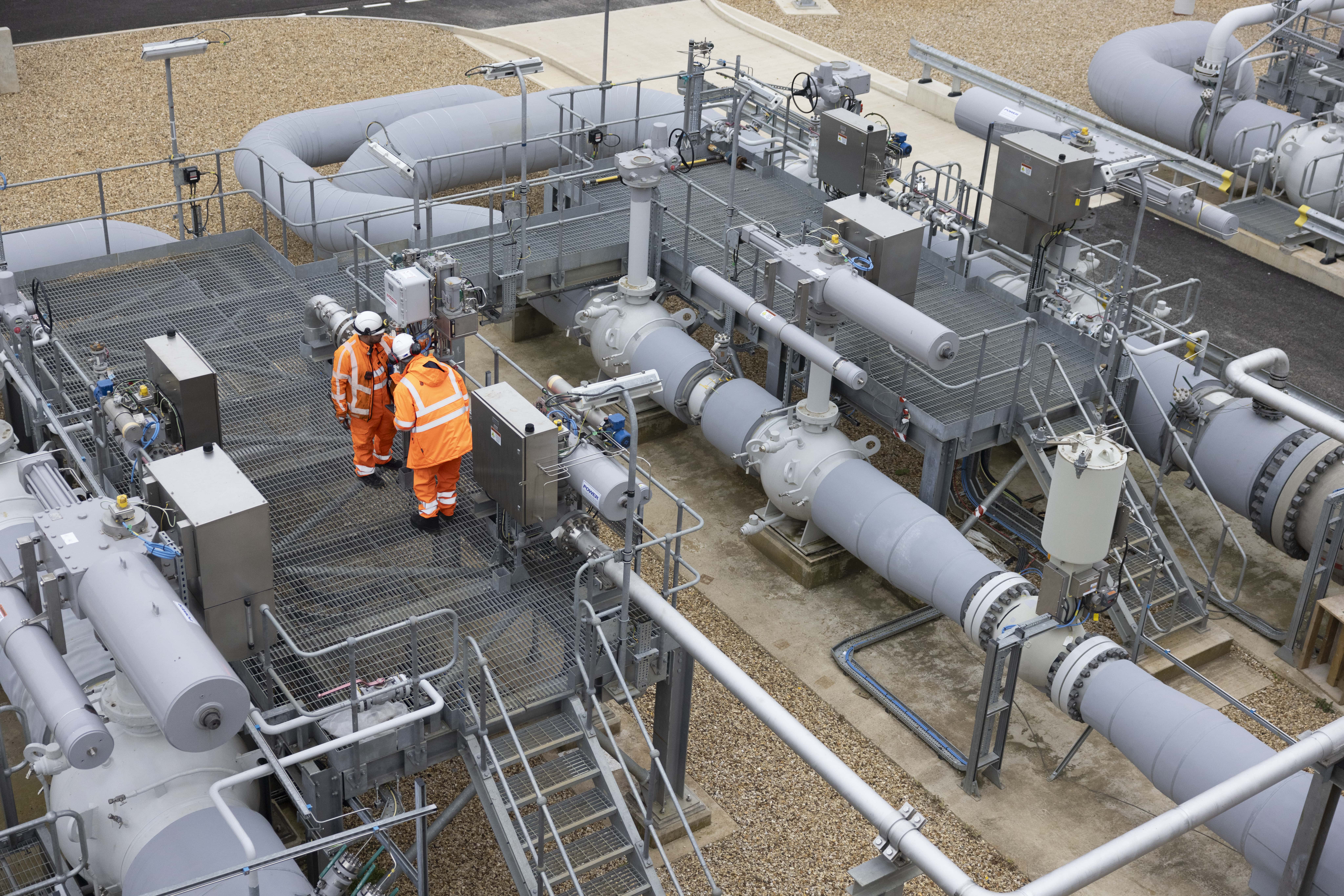About Us
Our Stakeholders
Working with stakeholders to achieve our ambitions
Our business relies on strong relationships with its stakeholders. For us, stakeholders are any individuals or organisations that have an interest in or are impacted by what we do. We cannot fulfil our purpose and ambitions without working with our stakeholders.

Introducing our stakeholders
Customers
Examples:
Shippers, directly connected industrial consumers/power stations, gas distribution networks (GDNs).
Description:
Customers depend on us to connect them to the energy they use safely, reliably and efficiently.
Consumers
Examples:
Homes and businesses, consumer representatives (e.g. Citizens Advice).
Description:
We ensure energy gets to where it’s needed, when it’s needed by consumers. While not directly interacting with consumers, we ensure we focus on what’s important to consumers through research and engagement with consumer representatives.
Energy industry stakeholders
Examples:
Other networks, trade bodies.
Description:
Due to the interconnectedness of the energy system, we work alongside the wider industry and trade bodies to ensure we deliver a clean energy transition for everyone.
Innovators and academics
Examples:
Universities, think-tanks, consultants.
Description:
Working collaboratively on some of today’s biggest challenges.
Suppliers
Examples:
Construction partners, service providers.
Description:
Work collaboratively with us to deliver services for our customers and consumers.
National and regional governments
Examples:
Westminster, devolved government, government departments, local government and local authorities.
Description:
Set the policy framework for energy.
Financial and non-financial regulators
Examples:
Ofgem, Health & Safety Executive, Environment Agency/ SEPA/ Natural Resources Wales.
Description:
Regulate what we do and how we do it to ensure we are working in the interests of customers, consumers and the British economy.
Help to shape the gas transmission system of the future
Throughout the year, we run a programme of events for our stakeholders. The aim is to engage and inform, with a focus on tackling the challenges being experienced across the wider energy industry. These events help to guide our decision-making processes across all areas of the business.
Recent stakeholder engagement materials
RIIO-GT3: Deep Dive on our IT Plan | September 2024
Ahead of our RIIO-GT3 Business Plan submission at the end of 2024, we walked our customers and stakeholders through the IT elements of our proposed business plan, in line with Ofgem's three regulatory outcomes:
- Secure and resilient supplies
- Infrastructure fit for a low cost transition to net zero, and
- High quality of service from regulated firms.
In this session, we covered:
- Our RIIO-GT3 Business Plan for IT,
- Our key drivers and enablers for IT investment, and
- How we will be finalising our plans.
We also held a Q&A and live polling as part of this session.
RIIO-GT3: Our Business Plan Overview | August 2024
In August 2024, we published our "Business Plan Overview" suite of documents, explaining the structure and key investment areas of the business plan which we will be submitting to Ofgem at the end of the year. This webinar was accompanied by a Q&A session and an online consultation on the document suite.
RIIO-GT3: Our Asset Management Plan Explained | August 2024
Ahead of our RIIO-GT3 Business Plan submission at the end of 2024, we walked our customers and stakeholders through the basis of our draft Asset Management Plan. We explained, and took your questions on:
- What an Asset Management Plan is,
- How ours has been built,
- What is contained within our plan, and
- How this links into our wider business plan for RIIO-GT3.
RIIO-GT3: Deep Dive on Gas System Operation | August 2024
Ahead of our RIIO-GT3 Business Plan submission at the end of 2024, we walked our customers and stakeholders through some of the changes to the operating environment since the start of RIIO-T2, and the Gas System Operation elements of our proposed business plan submission.
We presented our proposals in line with Ofgem's regulatory priorities:
- Secure and resilient supplies
- Infrastructure fit for a low cost transition to net zero, and
- High quality of service from regulated firms
We also held live polls to gauge acceptability and wider opinions on our proposals.
Ahead of our RIIO-GT3 Business Plan submission at the end of 2024, we shared an update on our stakeholder engagement to date, provided an outline for engagement in the months to come, and how our valued customers and stakeholders could stay involved.
Developing our Future Plans Together | November 2023
We recently shared how we are ramping up our engagement with our customers and stakeholders.
We want to hear from you now and into the future, as we prepare for our RIIO3 submission in 12 months. This is your chance to learn more about our vision, values and goals, and to share your feedback, ideas and questions with us. Don’t miss this opportunity to be part of the conversation and help us shape the future of our business.
Update on Non-Transmission Charges | February 2023
During December 2022, we shared an update on the indicative prices for General Non-Transmission Services charges for October 2023 and subsequent years, including drivers of the changes and how these influence charges.
We would now like to share some updates on our proposed approach to updating General Non-Transmission Services charges for October 2023 and future years.
Exit Constraints | December 2022
Bridget Hartley, Head of Physical Operations talked through and responded to a number of your queries around identifying and managing exit capacity constraints.
This webinar was for our customers who off-take gas from the NTS (buy exit capacity) and explained exit constraints from an operational, commercial and Network Emergency Management perspective.
We are pleased to be able to share with you the full set of questions covered during, and submitted to, the Exit Constraint webinar, held on 16th December.
Following the Christmas and New Year break, we were asked to also include written responses to the many questions answered during the webinar. We have therefore added these alongside our answers to the Slido questions and grouped answers together to help you navigate the document. In addition, we have created a table of acronyms, which we hope will provide you with further clarity.
Update on Non-Transmission Charges | December 2022
In July, we shared an update and some indicative prices for Non-Transmission Charges, notably the General Non-Transmission Services Entry and Exit charges, and some of the drivers behind them.
This webinar is an opportunity to share some updates on the impacts of changing costs after the publication of the October 2022 Non-Transmission charges and how such costs are driving Non-Transmission charges into the future, key drivers behind them and for you to ask any questions.
The final prices for October 2022 were published on 29th July and this update will look forwards to how changing costs impact future charges
Gas Demand Side Response (DSR) | November 2022
Join us on the subject of Gas Demand Side Response (Gas DSR). This follows recently approved reforms to the Gas DSR arrangements under UNC Modification 0822, which obliges NGG to run an annual invitation to offer process seeking commitments by shippers in advance, on behalf of large consumers, to offer DSR quantities for which they would be compensated at prices they define. NGG will be launching the first invitation process on 18th November 2022, for which a pre-communication was issued on Friday 4th November 2022.
The purpose of this webinar is to:
- Re-cap on the key elements of the DSR reforms
- Promote participation in this invitation event by encouraging the necessary discussions between shippers, suppliers and large gas consumers
- Elicit feedback from shippers and consumers about intentions to participate
- Encourage shippers and large consumers to respond to a NGG questionnaire about the invitation process and how Gas DSR could be further reformed to broaden access.
Response Arrangements Webinar | September 2022
Tom Wilcock, System Operations Emergency and Compliance Manager held a webinar to refresh the Energy Industry’s understanding of how a gas supply shortage is managed by the Industry. This is part of a series of assurance and awareness events leading into winter, including the delivery of the annual Network Emergency Coordinator (NEC) Industry Exercise, ‘Degree’.
The webinar included:
- An overview of revised processes
- A walk-through of initial steps taken to mitigate a deficit of gas
- A refresh of the Network Gas Supply Emergency (NGSE) strategy
- An opportunity for Q&A
Update on Non-Transmission Charges & October Statement | July 2022
On 29th June, we shared an update and some indicative prices for Non-Transmission Charges, notably the General Non-Transmission Services Entry and Exit charges, and some of the drivers behind them.
On 28th July we shared some further updates on the prices due to be published, key drivers and answered your questions.
In addition, here is a link to the Transmission System Charges webpage where you will find the October 2022 Transportation Statement published on 29th July.
Methane Emissions | March 2022
We are now in a position to share our proposals to implement improved detection and quantification of methane emissions from the UK gas national transmission system and the opportunities we have identified to reduce and where possible eliminate methane emissions from our operations
Emergency Curtailment Quantity (ECQ) | March 2022
An industry webinar event sponsored by the E3C Gas Task Group, to examine and assure preparedness for the restoration of the gas network following an NGSE.
Consumer Choice Debate | January 2022
Join expert panellists representing Citizens Advice, Energy Savings Trust, Energy Systems Catapult, Greenpeace, National Energy Action and Sustainability First to explore what choices do consumers have today and what choices do they need as we transition to low carbon heating?
Bacton Terminal Strategy Playback | January 2022
Over the summer 2021, we worked with you to understand your needs of the site. This insight has been fed into the options and delivery programme which we shared in a webinar in November 2021. We have since spent time reviewing and triangulating stakeholder feedback and play back what we’ve heard and what we’re doing on the back of this.

